GRANT TRACKING AND REPORTING: THE NON-PROFIT NIGHTMARE THAT CAN DESTROY YOUR ORGANIZATION
Discover how poor grant tracking and reporting can lead to disaster for non-profits. Learn the essential strategies and tools to manage grants effectively and ensure the financial health and sustainability of your organization. As a non-profit organization, securing grants is a crucial aspect of funding your projects and achieving your mission. However, managing these grants can be a daunting task, especially when it comes to tracking and reporting. In this article, we will delve into the world of grant tracking and reporting, highlighting the common pitfalls and providing practical solutions to help you navigate this complex process.
THE CONSEQUENCES OF NEGLECTING GRANT TRACKING AND REPORTING
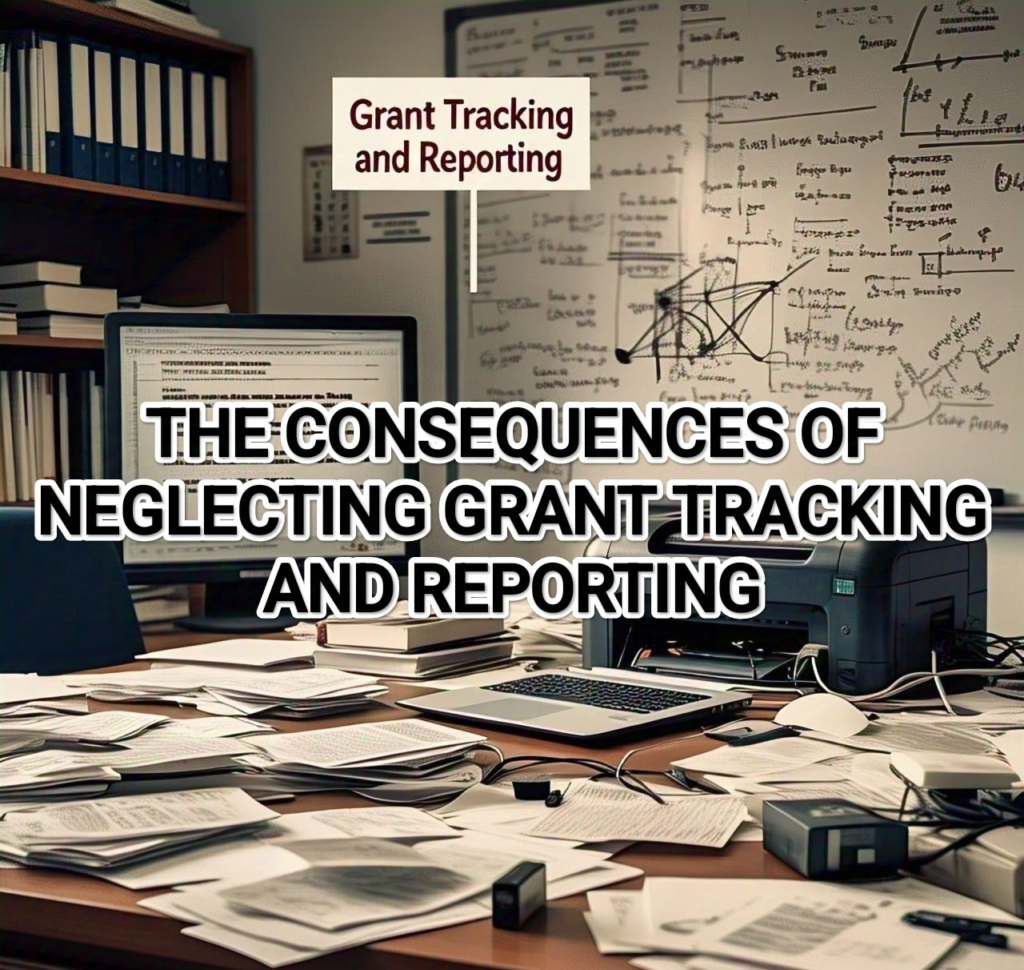
Neglecting grant tracking and reporting can have severe consequences for non-profit organizations. Grant tracking and reporting are essential components of grant management, and failing to prioritize these tasks can lead to a range of negative outcomes. In this section, we will explore the consequences of neglecting grant tracking and reporting, highlighting the potential risks and repercussions for non-profit organizations.
1. Loss of Funding
One of the most significant consequences of neglecting grant tracking and reporting is the loss of funding. Funders expect grantees to provide regular updates on their progress, and failure to do so can result in the termination of funding. This can have a devastating impact on non-profit organizations, which rely heavily on grants to support their programs and services.
When a non-profit organization fails to provide adequate grant tracking and reporting, funders may view this as a lack of accountability and transparency. This can damage the organization’s reputation and make it more challenging to secure funding in the future. In extreme cases, neglecting grant tracking and reporting can lead to the loss of accreditation or certification, further jeopardizing the organization’s funding prospects.
2. Non-Compliance and Penalties
Grant tracking and reporting are critical components of grant management, and failing to comply with funder requirements can result in severe penalties. Non-profit organizations that neglect grant tracking and reporting may be subject to:
– Financial penalties: Funders may impose financial penalties on non-profit organizations that fail to comply with grant tracking and reporting requirements.
– Loss of tax-exempt status: In extreme cases, neglecting grant tracking and reporting can lead to the loss of tax-exempt status, which can have severe financial implications for non-profit organizations.
– Damage to reputation: Non-compliance with grant tracking and reporting requirements can damage a non-profit organization’s reputation, making it more challenging to secure funding and support in the future.
3. Inefficient Use of Resources
Neglecting grant tracking and reporting can lead to an inefficient use of resources, as non-profit organizations may struggle to manage their grants effectively. This can result in:
– Duplication of efforts: Without adequate grant tracking and reporting, non-profit organizations may duplicate efforts, wasting valuable resources and funding.
– Ineffective program management: Neglecting grant tracking and reporting can make it challenging for non-profit organizations to manage their programs effectively, leading to poor outcomes and a lack of impact.
– Missed opportunities: Inefficient use of resources can result in missed opportunities, as non-profit organizations may fail to capitalize on funding opportunities or partnerships.
4. Lack of Transparency and Accountability
Grant tracking and reporting are essential for transparency and accountability in non-profit organizations. Neglecting these tasks can lead to:
– Lack of trust: Donors, funders, and stakeholders may lose trust in non-profit organizations that neglect grant tracking and reporting, making it more challenging to secure funding and support.
– Inability to measure impact: Without adequate grant tracking and reporting, non-profit organizations may struggle to measure their impact, making it challenging to demonstrate their effectiveness and value.
– Missed opportunities for growth: Neglecting grant tracking and reporting can result in missed opportunities for growth, as non-profit organizations may fail to identify areas for improvement and capitalize on new funding opportunities.
5. Damage to Reputation and Relationships
Neglecting grant tracking and reporting can damage a non-profit organization’s reputation and relationships with funders, donors, and stakeholders. This can result in:
– Loss of funding: Funders may view neglecting grant tracking and reporting as a lack of accountability and transparency, leading to a loss of funding.
– Damage to relationships: Neglecting grant tracking and reporting can damage relationships with funders, donors, and stakeholders, making it more challenging to secure funding and support in the future.
– Missed opportunities for collaboration: Neglecting grant tracking and reporting can result in missed opportunities for collaboration, as non-profit organizations may fail to demonstrate their value and effectiveness to potential partners.
NOTE: neglecting grant tracking and reporting can have severe consequences for non-profit organizations. It is essential for organizations to prioritize these tasks, ensuring transparency, accountability, and effective use of resources. By doing so, non-profit organizations can maintain a strong reputation, secure funding, and achieve their mission.
UNDERSTANDING THE IMPORTANCE OF GRANT TRACKING AND REPORTING

Grant tracking and reporting are essential components of grant management. They involve monitoring and documenting how grant funds are being used, ensuring that the project is progressing as planned, and reporting back to the funder on the outcomes and impact of the project.
DEFINITION OF GRANT TRACKING AND REPORTING
Grant tracking and reporting are essential components of grant management, enabling non-profit organizations to effectively manage their grants and ensure compliance with funder requirements.
Grant Tracking:
Grant tracking refers to the process of monitoring and documenting the progress of a grant-funded project or program. This involves:
1. Recording and storing grant-related documents: Maintaining accurate and up-to-date records of grant agreements, reports, and other relevant documents.
2. Tracking grant expenditures: Monitoring and documenting how grant funds are being used, ensuring that expenses are aligned with the grant budget and funder requirements.
3. Monitoring project progress: Regularly tracking and documenting project milestones, outcomes, and impact, ensuring that the project is on track to meet its objectives.
4. Identifying and addressing issues: Proactively identifying and addressing any issues or challenges that may arise during the grant period, ensuring that the project remains on track and that funder requirements are met.
Grant Reporting:
Grant reporting refers to the process of providing regular updates and reports to funders on the progress and outcomes of a grant-funded project or program. This involves:
1. Preparing and submitting reports: Developing and submitting regular reports to funders, providing updates on project progress, outcomes, and impact.
2. Providing financial reports: Submitting financial reports to funders, detailing how grant funds have been used and ensuring that expenses are aligned with the grant budget.
3. Sharing project outcomes and impact: Reporting on the outcomes and impact of the project, demonstrating how the grant funds have been used to achieve the project’s objectives.
4. Responding to funder inquiries: Providing timely and accurate responses to funder inquiries, addressing any questions or concerns they may have about the project.
Effective grant tracking and reporting are critical for several reasons:
1. Accountability: Grant tracking and reporting demonstrate accountability to the funder, showing that the grant funds are being used for the intended purpose.
2. Compliance: Grant tracking and reporting ensure compliance with the terms and conditions of the grant, avoiding any potential penalties or loss of funding.
3. Project Management: Grant tracking and reporting provide valuable insights into project progress, enabling organizations to make informed decisions and adjust their strategies as needed.
4. Future Funding: A strong track record of grant tracking and reporting can improve an organization’s chances of securing future funding, as it demonstrates their ability to manage grants effectively.
5. Transparency: Grant tracking and reporting promote transparency, ensuring that stakeholders, including funders, board members, and the public, have access to information about the organization’s grant-funded activities.
BENEFITS OF GRANT TRACKING AND REPORTING
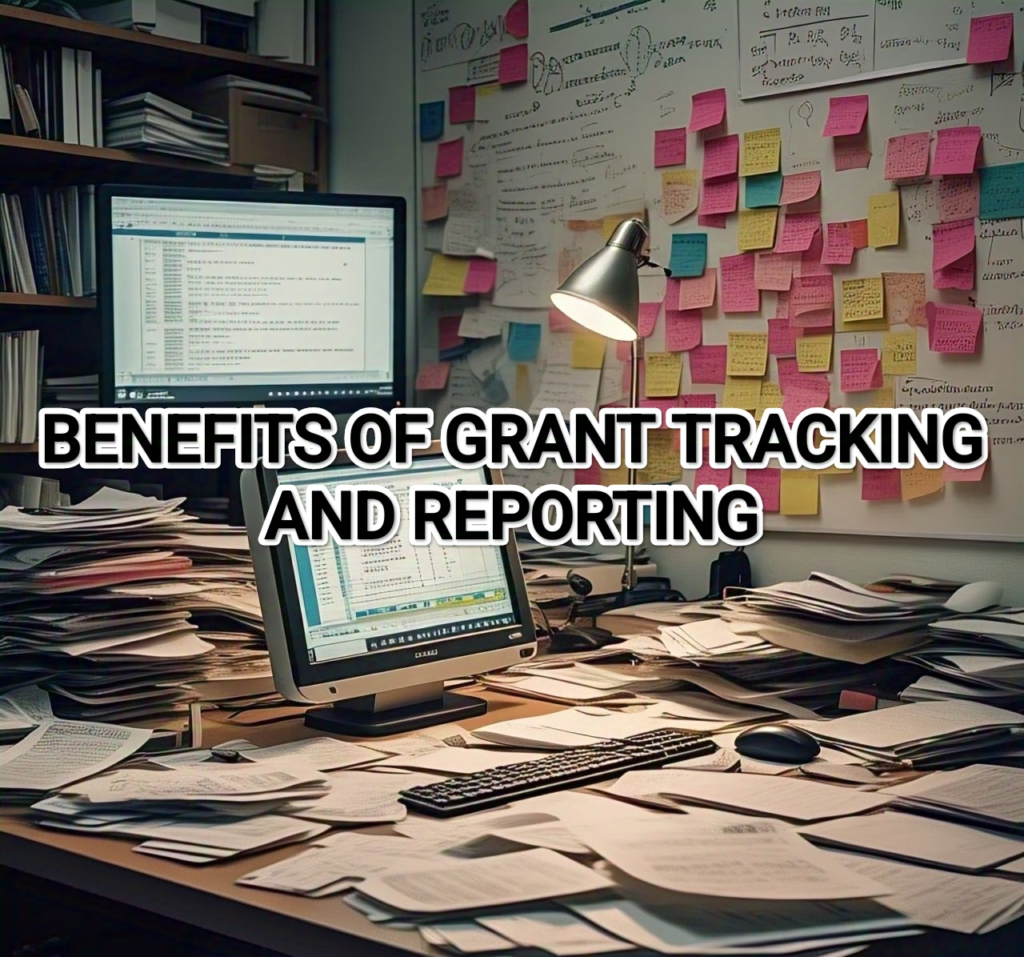
Implementing effective grant tracking and reporting systems can bring numerous benefits to non-profit organizations, including:
1. Improved Financial Management: Grant tracking and reporting enable organizations to manage their finances more effectively, ensuring that grant funds are being used efficiently and effectively.
2. Enhanced Accountability: Grant tracking and reporting promote accountability, demonstrating to funders and stakeholders that the organization is responsible and transparent in its use of grant funds.
3. Better Decision-Making: Grant tracking and reporting provide valuable insights into project progress, enabling organizations to make informed decisions and adjust their strategies as needed.
4. Increased Funding Opportunities: A strong track record of grant tracking and reporting can improve an organization’s chances of securing future funding, as it demonstrates their ability to manage grants effectively.
5. Reduced Risk: Grant tracking and reporting can help organizations reduce the risk of non-compliance, penalties, and loss of funding.
TYPES OF GRANTS AND FUNDING SOURCES

Grants and funding sources are essential for non-profit organizations, providing the necessary resources to support their programs and services. There are various types of grants and funding sources available, each with its own unique characteristics, requirements, and benefits. In this section, we will explore the different types of grants and funding sources, providing a detailed explanation of each.
1. Government Grants
Government grants are a type of funding provided by federal, state, or local governments to support specific programs, projects, or initiatives. These grants are often competitive, with a rigorous application and review process.
Government grants can be categorized into several sub-types, including:
– Federal Grants: Provided by the federal government, these grants support a wide range of programs and projects, from healthcare and education to infrastructure and economic development.
– State Grants: Offered by state governments, these grants support state-specific initiatives and programs, such as education, healthcare, and economic development.
– Local Grants: Provided by local governments, such as cities or counties, these grants support community-based initiatives and projects, such as parks and recreation, public safety, and economic development.
2. Foundation Grants
Foundation grants are provided by private foundations, corporate foundations, or community foundations to support specific programs, projects, or initiatives. These grants are often competitive, with a rigorous application and review process.
Foundation grants can be categorized into several sub-types, including:
– Private Foundation Grants: Provided by private foundations, these grants support a wide range of programs and projects, from education and healthcare to arts and culture.
– Corporate Foundation Grants: Offered by corporate foundations, these grants support initiatives and projects that align with the company’s mission and values.
– Community Foundation Grants: Provided by community foundations, these grants support local initiatives and projects, such as education, healthcare, and economic development.
3. Corporate Grants
Corporate grants are provided by companies to support specific programs, projects, or initiatives that align with their mission and values. These grants are often competitive, with a rigorous application and review process.
Corporate grants can be categorized into several sub-types, including:
– Cash Grants: Provided as a direct cash donation to support a specific program or project.
– In-Kind Grants: Provided as a donation of goods or services, such as equipment, supplies, or expertise.
– Employee Volunteer Grants: Provided as a donation of employee time and expertise to support a specific program or project.
4. Individual Donor Grants
Individual donor grants are provided by individuals to support specific programs, projects, or initiatives. These grants are often less competitive than government or foundation grants, with a more flexible application and review process.
Individual donor grants can be categorized into several sub-types, including:
– Major Gifts: Large donations provided by individual donors to support a specific program or project.
– Planned Gifts: Donations provided by individual donors through estate planning, such as wills, trusts, or annuities.
– Crowdfunding: Online fundraising campaigns that allow individual donors to contribute small amounts to support a specific program or project.
5. International Grants
International grants are provided by governments, foundations, or corporations to support global initiatives and projects. These grants are often competitive, with a rigorous application and review process.
International grants can be categorized into several sub-types, including:
– Global Health Grants: Provided to support global health initiatives and projects, such as disease prevention, treatment, and research.
– International Development Grants: Provided to support international development initiatives and projects, such as poverty reduction, education, and economic development.
– Human Rights Grants: Provided to support human rights initiatives and projects, such as advocacy, education, and community development.
6. Research Grants
Research grants are provided to support research initiatives and projects in various fields, such as science, technology, engineering, and mathematics (STEM). These grants are often competitive, with a rigorous application and review process.
Research grants can be categorized into several sub-types, including:
– Federal Research Grants: Provided by federal agencies, such as the National Institutes of Health (NIH) or the National Science Foundation (NSF).
– Foundation Research Grants: Provided by private foundations, such as the Bill and Melinda Gates Foundation or the Ford Foundation.
– Corporate Research Grants: Provided by companies to support research initiatives and projects that align with their mission and values.
In conclusion, there are various types of grants and funding sources available to support non-profit organizations. Each type of grant has its own unique characteristics, requirements, and benefits. By understanding the different types of grants and funding sources, non-profit organizations can better navigate the funding landscape and secure the resources they need to achieve their mission.
KEY COMPONENTS OF GRANT TRACKING AND REPORTING
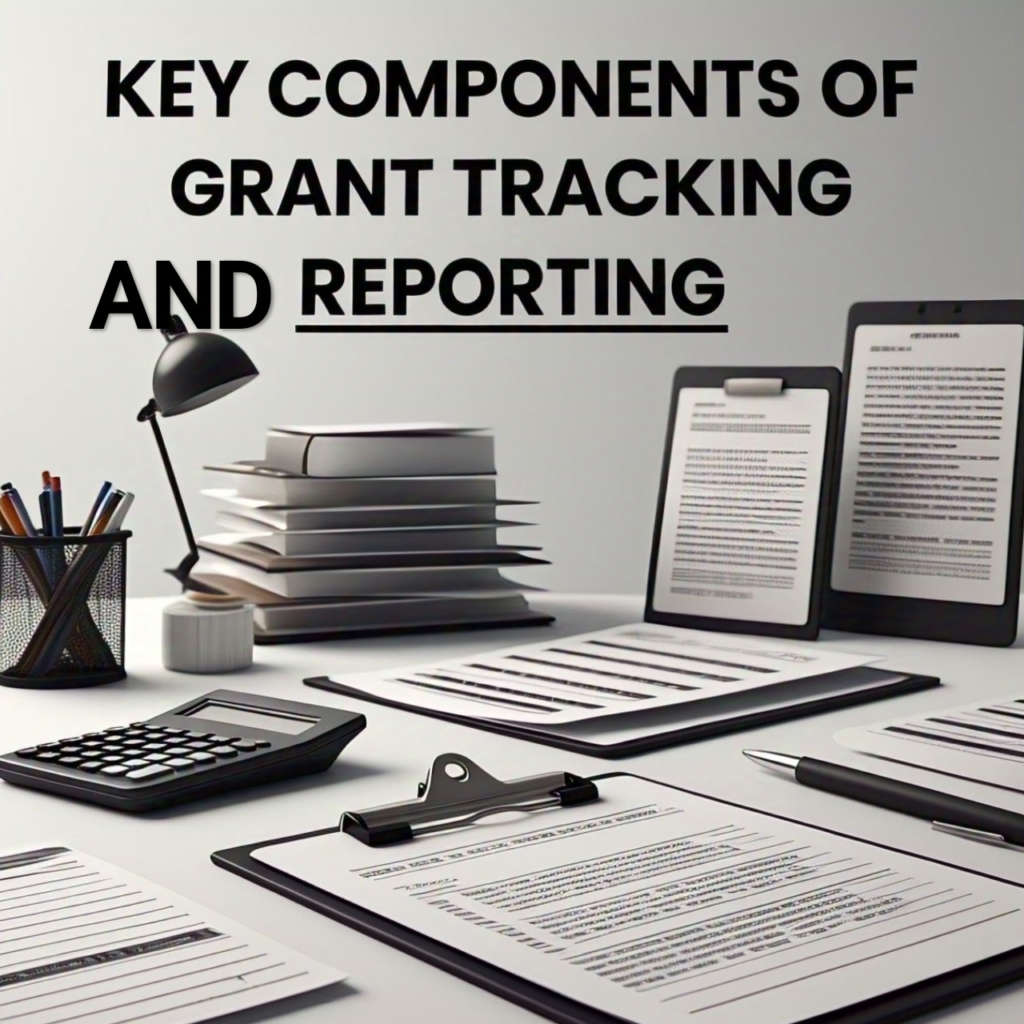
Grant tracking and reporting are critical components of grant management, enabling non-profit organizations to effectively manage their grants and ensure compliance with funder requirements. The following are the key components of grant tracking and reporting:
1. Grant Agreement and Terms
A grant agreement outlines the terms and conditions of the grant, including the grant amount, project timeline, and reporting requirements. It is essential to carefully review and understand the grant agreement to ensure compliance with funder requirements.
2. Grant Budgeting and Financial Management
Effective grant budgeting and financial management are critical components of grant tracking and reporting. This involves:
– Creating a detailed grant budget that outlines projected income and expenses
– Tracking and documenting grant expenditures to ensure alignment with the grant budget
– Ensuring that financial reports are accurate, complete, and submitted on time
3. Project Progress Tracking
Project progress tracking involves regularly monitoring and documenting project milestones, outcomes, and impact. This includes:
– Developing a project timeline and milestones
– Tracking and documenting project progress against milestones
– Identifying and addressing any issues or challenges that may arise during the project
4. Reporting and Communication
Reporting and communication are critical components of grant tracking and reporting. This involves:
– Preparing and submitting regular reports to funders, providing updates on project progress, outcomes, and impact
– Ensuring that reports are accurate, complete, and submitted on time
– Maintaining open and transparent communication with funders, responding promptly to inquiries and addressing any concerns
5. Compliance and Risk Management
Compliance and risk management are essential components of grant tracking and reporting. This involves:
– Ensuring compliance with funder requirements, including reporting and budgeting requirements
– Identifying and mitigating potential risks, such as non-compliance, financial mismanagement, or project delays
– Developing and implementing policies and procedures to ensure compliance and risk management
6. Grant Closeout and Evaluation
Grant closeout and evaluation involve ensuring that all grant requirements have been met and evaluating the project’s outcomes and impact. This includes:
– Ensuring that all grant funds have been expended and accounted for
– Submitting a final report to the funder, detailing project outcomes and impact
– Evaluating the project’s outcomes and impact, identifying lessons learned and areas for improvement
7. Record Keeping and Documentation
Record keeping and documentation are critical components of grant tracking and reporting. This involves:
– Maintaining accurate and detailed records of grant-related documents, including grant agreements, reports, and financial records
– Ensuring that records are easily accessible and retrievable
– Maintaining confidentiality and security of grant-related records
8. Grant Management Software and Tools
Grant management software and tools can help streamline grant tracking and reporting, improving efficiency and reducing errors. This includes:
– Utilizing grant management software, such as Instrumentl or Submittable, to track grant applications, reporting, and deadlines
– Leveraging project management tools, such as Asana or Trello, to track project progress and milestones
– Using financial management software, such as QuickBooks or Xero, to track grant expenditures and financial reports
9. Training and Capacity Building
Training and capacity building are essential components of grant tracking and reporting. This involves:
– Providing training and support to staff members on grant tracking and reporting requirements
– Ensuring that staff members have the necessary skills and expertise to manage grants effectively
– Identifying areas for improvement and providing capacity-building opportunities to enhance grant management capabilities
10. Audit and Compliance
Audit and compliance are critical components of grant tracking and reporting. This involves:
– Ensuring that grant-related records and documents are accurate, complete, and compliant with funder requirements
– Conducting regular audits to ensure compliance with funder requirements and identify areas for improvement
– Addressing any audit findings or compliance issues promptly and effectively
COMMON CHALLENGES IN GRANT TRACKING AND REPORTING
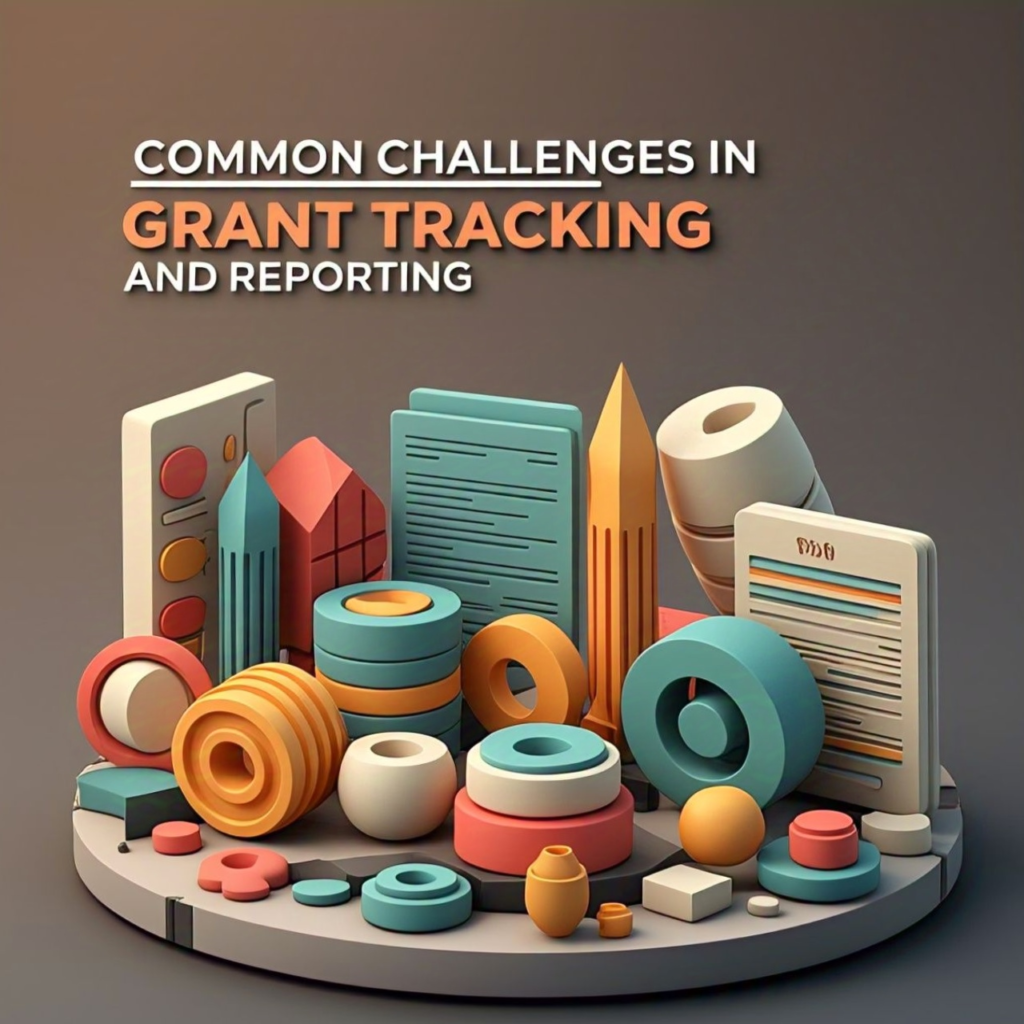
Despite the importance of grant tracking and reporting, many non-profit organizations struggle with this process. Some common challenges include:
1. Lack of Resources: Many non-profit organizations lack the necessary resources, including personnel, technology, and expertise, to effectively track and report on grants.
2. Complexity: Grant tracking and reporting can be complex, especially when dealing with multiple grants, funders, and projects. This complexity can lead to errors, inconsistencies, and non-compliance.
3. Time-Consuming: Grant tracking and reporting can be time-consuming, taking away from other important tasks and responsibilities. This can be particularly challenging for small organizations with limited staff.
4. Limited Expertise: Non-profit organizations may not have the necessary expertise in grant management, accounting, and reporting, leading to errors and non-compliance.
5. Inadequate Technology: Many non-profit organizations lack the necessary technology, such as grant management software, to effectively track and report on grants.
6. Poor Communication: Poor communication between staff members, funders, and other stakeholders can lead to misunderstandings, errors, and non-compliance.
7. Inconsistent Reporting: Inconsistent reporting can lead to errors, inconsistencies, and non-compliance. This can be particularly challenging when dealing with multiple grants and funders.
8. Difficulty in Measuring Outcomes: Measuring outcomes and impact can be challenging, especially for organizations that lack the necessary expertise or resources.
9. Limited Transparency: Limited transparency can lead to mistrust and skepticism among funders, donors, and other stakeholders.
10. Insufficient Training: Insufficient training and capacity building can lead to errors, inconsistencies, and non-compliance.
11. High Staff Turnover: High staff turnover can lead to a lack of institutional knowledge, making it challenging to track and report on grants.
12. Limited Budget: Limited budget can make it challenging for organizations to invest in the necessary resources, technology, and expertise to effectively track and report on grants.
13. Difficulty in Managing Multiple Grants: Managing multiple grants can be challenging, especially when dealing with different funders, projects, and reporting requirements.
14. Limited Access to Funding Opportunities: Limited access to funding opportunities can make it challenging for organizations to secure the necessary funding to support their programs and services.
15. Difficulty in Building Relationships with Funders: Building relationships with funders can be challenging, especially for small or new organizations.
By understanding these common challenges, non-profit organizations can better prepare themselves to overcome them and ensure effective grant tracking and reporting.
PRACTICAL SOLUTIONS FOR GRANT TRACKING AND REPORTING
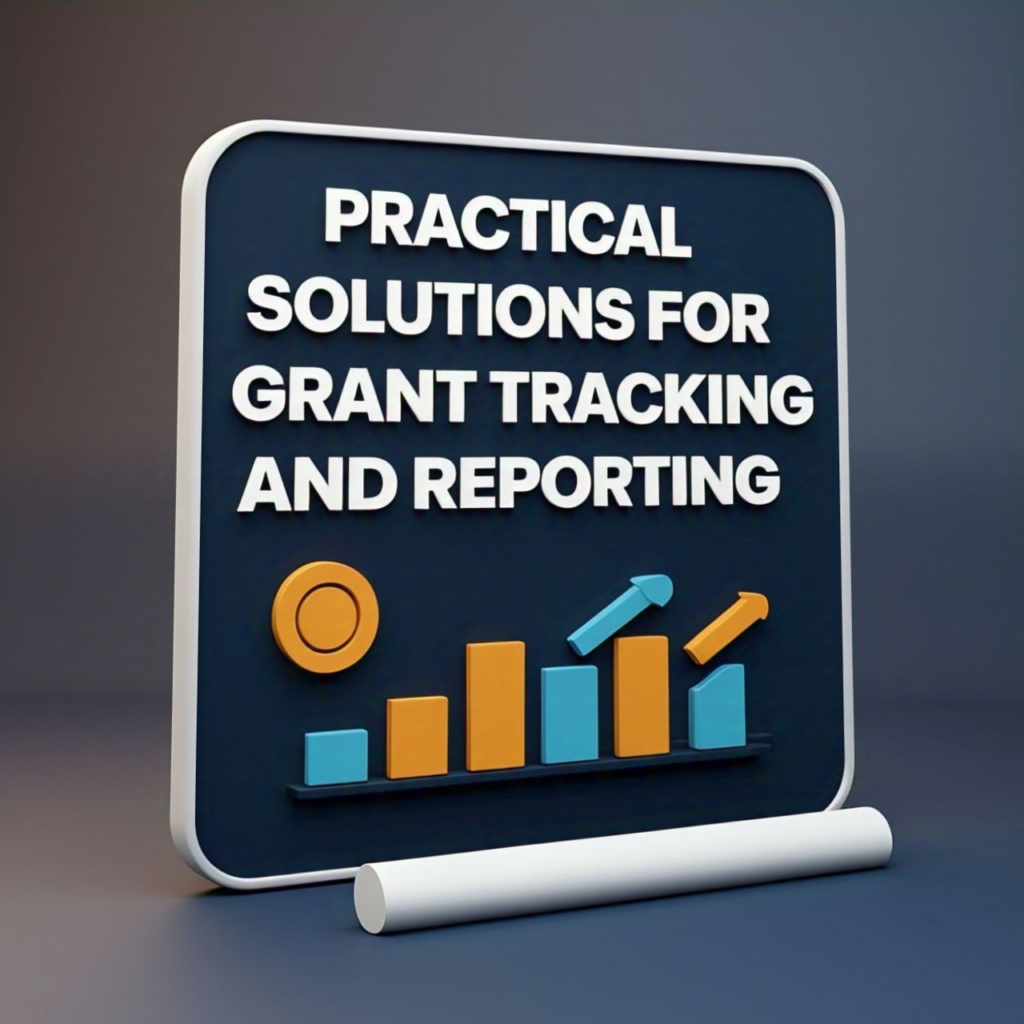
To overcome the challenges of grant tracking and reporting, non-profit organizations can implement the following practical solutions:
1. Invest in Grant Management Software: Utilize grant management software, such as Instrumentl, Submittable, or Fluxx, to streamline grant tracking and reporting.
2. Develop a Grant Management Plan: Create a comprehensive grant management plan, outlining roles and responsibilities, timelines, and reporting requirements.
3. Designate a Grant Manager: Appoint a dedicated grant manager to oversee grant tracking and reporting, ensuring consistency and accuracy.
4. Establish a Reporting Schedule: Develop a reporting schedule, ensuring that reports are submitted on time and in accordance with funder requirements.
5. Provide Training and Support: Offer training and support to staff members, ensuring they understand the importance of grant tracking and reporting and are equipped to perform these tasks effectively.
6. Utilize Spreadsheets and Templates: Use spreadsheets and templates to track and report on grant-related data, ensuring consistency and accuracy.
7. Implement a Document Management System: Implement a document management system, such as Google Drive or Dropbox, to store and manage grant-related documents.
8. Conduct Regular Audits: Conduct regular audits to ensure compliance with funder requirements and identify areas for improvement.
9. Foster Collaboration and Communication: Foster collaboration and communication among staff members, funders, and other stakeholders to ensure that everyone is informed and aligned.
10. Continuously Evaluate and Improve: Continuously evaluate and improve grant tracking and reporting systems, identifying areas for improvement and implementing changes as needed.
11. Utilize Online Resources and Tools: Utilize online resources and tools, such as grant management blogs and webinars, to stay up-to-date on best practices and regulatory requirements.
12. Develop a Grant Tracking and Reporting Policy: Develop a grant tracking and reporting policy, outlining procedures and protocols for managing grants.
13. Establish a Grant Review Committee: Establish a grant review committee, responsible for reviewing and approving grant applications and reports.
14.Utilize Grant Management Consultants: Utilize grant management consultants, providing expert guidance and support on grant tracking and reporting.
15. Invest in Staff Development: Invest in staff development, providing training and capacity-building opportunities to enhance grant management skills.
By implementing effective grant tracking and reporting systems, non-profit organizations can ensure accountability, compliance, and transparency, ultimately improving their chances of securing future funding and achieving their mission.
FREQUENTLY ASKED QUESTIONS
General Questions
1. What is grant tracking and reporting?
Grant tracking and reporting involve monitoring and documenting the progress of a grant-funded project or program, and providing regular updates and reports to funders.
2. Why is grant tracking and reporting important?
Grant tracking and reporting are essential for ensuring compliance with funder requirements, demonstrating accountability and transparency, and maximizing funding opportunities.
3. What are the consequences of neglecting grant tracking and reporting?
Neglecting grant tracking and reporting can lead to non-compliance, loss of funding, damage to reputation, and missed opportunities for future funding.
Grant Management Questions
1. What is a grant management plan?
A grant management plan is a comprehensive plan that outlines the roles and responsibilities, timelines, and reporting requirements for managing a grant.
2. What is a grant tracking system?
A grant tracking system is a system or tool used to monitor and document the progress of a grant-funded project or program.
3. What is a grant reporting schedule?
A grant reporting schedule is a schedule that outlines the frequency and deadlines for submitting reports to funders.
Technical Questions
1. What is grant management software?
Grant management software is a type of software that helps organizations manage grants, including tracking and reporting.
2. What are the benefits of using grant management software?
The benefits of using grant management software include improved efficiency, accuracy, and compliance, as well as enhanced reporting and analytics capabilities.
3. How do I choose the right grant management software for my organization?
When choosing grant management software, consider factors such as functionality, scalability, ease of use, and cost.
Best Practices Questions
1. What are best practices for grant tracking and reporting?
Best practices for grant tracking and reporting include establishing a grant management plan, using a grant tracking system, and providing regular reports to funders.
2. How can I ensure compliance with funder requirements?
To ensure compliance with funder requirements, carefully review and understand the grant agreement, establish a grant management plan, and provide regular reports to funders.
3. What are common mistakes to avoid in grant tracking and reporting?
Common mistakes to avoid in grant tracking and reporting include inaccurate or incomplete reporting, failure to provide regular updates, and non-compliance with funder requirements.
THINGS TO AVOID IN GRANT TRACKING AND REPORTING

To ensure effective grant tracking and reporting, non-profit organizations should avoid the following common mistakes:
Inaccurate or Incomplete Reporting
1. Inaccurate financial reporting: Ensure that financial reports are accurate, complete, and compliant with funder requirements.
2. Incomplete narrative reporting: Provide comprehensive narrative reports that include all required information, such as project progress, outcomes, and impact.
3. Failure to disclose conflicts of interest: Disclose any conflicts of interest or potential conflicts of interest in grant reports.
Non-Compliance with Funder Requirements
1. Failure to meet reporting deadlines: Submit reports on time, meeting all deadlines and requirements.
2. Non-compliance with grant agreement terms: Ensure that all grant agreement terms are met, including budget, timeline, and deliverables.
3. Failure to obtain required approvals: Obtain all necessary approvals, including those for budget revisions, scope changes, or no-cost extensions.
Poor Communication and Collaboration
1. Lack of communication with funders: Maintain open and transparent communication with funders, responding promptly to inquiries and addressing concerns.
2. Inadequate collaboration with stakeholders: Collaborate with stakeholders, including project partners, community members, and other organizations, to ensure successful project implementation.
3. Failure to involve key personnel: Involve key personnel, including project managers, finance staff, and program staff, in grant tracking and reporting.
Inadequate Record Keeping and Documentation
1. Inadequate grant file management: Maintain accurate and complete grant files, including all relevant documents, reports, and correspondence.
2. Lack of documentation: Document all grant-related activities, including meetings, conversations, and decisions.
3. Failure to retain required records: Retain all required records, including financial records, grant agreements, and reports.
Insufficient Training and Capacity Building
1. Lack of training on grant tracking and reporting: Provide training and capacity-building opportunities for staff members on grant tracking and reporting.
2. Insufficient expertise: Ensure that staff members have the necessary expertise and skills to manage grants effectively.
3. Failure to stay up-to-date on regulatory requirements: Stay current with changing regulatory requirements and best practices in grant tracking and reporting.
Inadequate Budgeting and Financial Management
1. Inadequate budgeting: Develop accurate and comprehensive budgets that account for all grant-related expenses.
2. Poor financial management: Ensure that grant funds are managed effectively, with adequate controls and oversight.
3. Failure to monitor cash flow: Monitor cash flow regularly to ensure that grant funds are being used efficiently and effectively.
Failure to Evaluate and Improve
1. Lack of evaluation: Regularly evaluate grant tracking and reporting processes to identify areas for improvement.
2. Failure to implement improvements: Implement improvements and adjustments to grant tracking and reporting processes as needed.
3. Inadequate use of data and metrics: Use data and metrics to inform grant tracking and reporting, ensuring that decisions are data-driven and effective.
By avoiding these common mistakes, non-profit organizations can ensure effective grant tracking and reporting, maintaining compliance with funder requirements and maximizing funding opportunities.
CONCLUSION
Grant tracking and reporting are critical components of grant management, and neglecting these tasks can have severe consequences for non-profit organizations. Effective grant tracking and reporting require careful planning, attention to detail, and a deep understanding of funder requirements.
In this discussion, we have explored the importance of grant tracking and reporting, common challenges, practical solutions, and things to avoid. We have also examined the key components of grant tracking and reporting, including grant agreements, budgeting, project progress tracking, reporting, and record keeping.
To ensure effective grant tracking and reporting, non-profit organizations should:
1. Develop a comprehensive grant management plan
2. Invest in grant management software and tools
3. Provide training and support to staff members
4. Establish a reporting schedule and stick to it
5. Maintain accurate and complete records
6. Continuously evaluate and improve grant tracking and reporting processes
By prioritizing grant tracking and reporting, non-profit organizations can:
1. Ensure compliance with funder requirements
2. Demonstrate accountability and transparency
3. Maximize funding opportunities
4. Improve project outcomes and impact
5. Enhance reputation and credibility
In conclusion, grant tracking and reporting are essential for non-profit organizations, and neglecting these tasks can have devastating consequences. By understanding the importance of grant tracking and reporting, and implementing effective strategies and solutions, non-profit organizations can ensure successful grant management and achieve their mission.
CALL TO ACTION
Don’t let grant tracking and reporting become a nightmare for your non-profit organization! Take action today by reaching out to us on sjohn@glhaccounting.ca to ensure that you are effectively managing your grants and maintaining compliance with funder requirements.
Immediate Action Steps:
1. Conduct a Grant Management Audit: Review your current grant management processes and identify areas for improvement.
2. Develop a Comprehensive Grant Management Plan: Create a plan that outlines your grant management processes, including grant tracking, reporting, and record keeping.
3. Invest in Grant Management Software: Explore grant management software options that can help streamline your grant tracking and reporting processes.
4. Provide Training and Support to Staff: Ensure that your staff has the necessary training and support to effectively manage grants and maintain compliance with funder requirements.
5. Establish a Reporting Schedule: Develop a reporting schedule that ensures timely and accurate reporting to funders.
Long-Term Action Steps:
1. Continuously Evaluate and Improve Grant Management Processes: Regularly review and refine your grant management processes to ensure they remain effective and efficient.
2. Stay Up-to-Date on Regulatory Requirements: Stay informed about changing regulatory requirements and best practices in grant management.
3. Develop a Culture of Transparency and Accountability: Foster a culture that values transparency and accountability in grant management, ensuring that your organization maintains the highest level of integrity.
ABOUT AUTHOR
Shanel John is a dedicated Certified Public Accountant (CPA) at G.L.H. Accounting, specializing in Income Tax with 10 years of experience. Based in Brampton, Ontario, Canada, Shanel offers expertise in tax preparation, financial accounting, and advisory services. A certified QBO Pro Advisor, Shanel’s decade-long experience and knowledge make her a trusted figure in the accounting field.
ADDITIONAL RESOURCES
Grants:
- Student Grant: https://www.canada.ca/en/services/benefits/education/student-aid/grants-loans.html
- Apprenticeship Grant: https://www.canada.ca/en/employment-social-development/corporate/reports/evaluations/apprenticeship-grants-impact.html
By leveraging these resources, non-profit organizations can stay up-to-date on best practices, regulatory requirements, and emerging trends in grant tracking and reporting.
